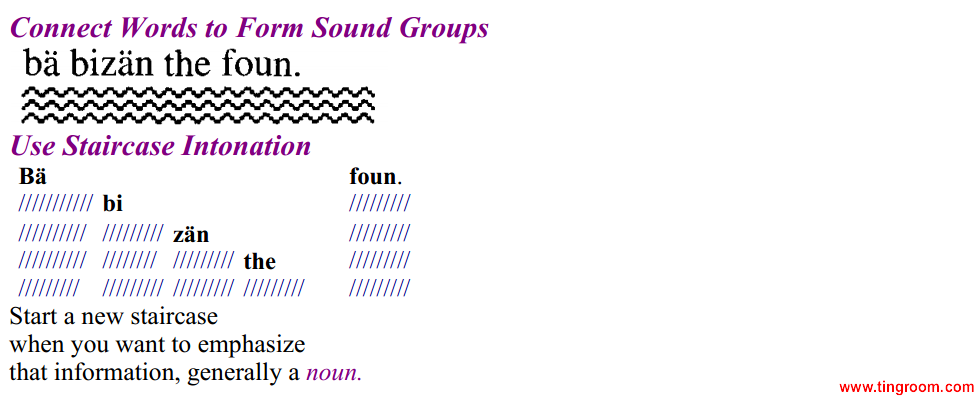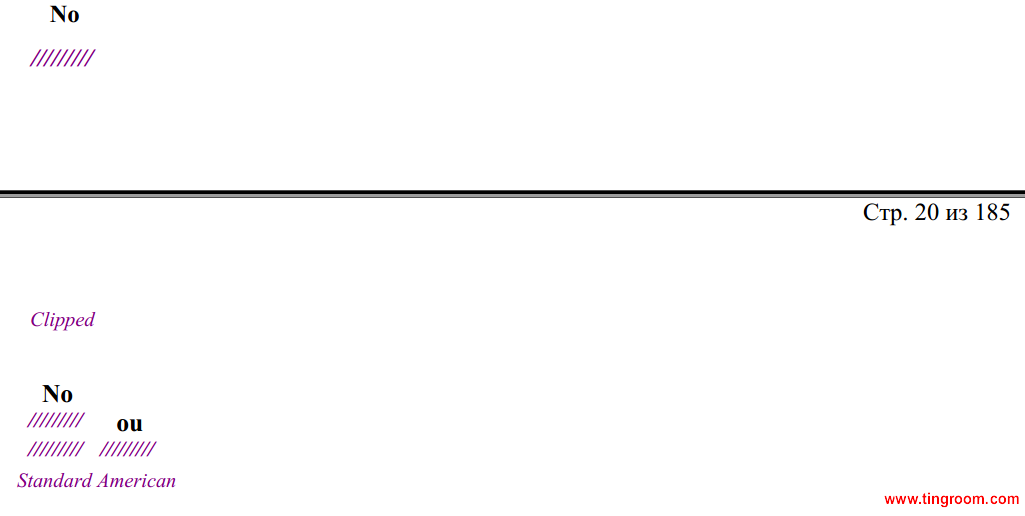-
(单词翻译:双击或拖选)
Chapter 1 American Intonation1
The American Speech Music CD 1 Track 4
What to Do with Your Mouth to Sound American
One of the main differences between the way an American talks and the way the rest of the world talks is that we don't really move our lips. (So, when an American says, "Read my lips!" what does he really mean?) We create most of our sounds in the throat, using our tongue very actively2. If you hold your fingers over your lips or clench3 your jaws4 when you practice speaking American English, you will find yourself much closer to native-sounding speech than if you try to pronounce every ... single ... sound ... very ... carefully.
If you can relate American English to music, remember that the indigenous5 music is jazz. Listen to their speech music, and you will hear that Americans have a melodic6, jazzy way of producing sounds. Imagine the sound of a cello7 when you say, Beddy bada bida beader budder (Betty bought a bit of better butter) and you'll be close to the native way of saying it.
Because most Americans came from somewhere else, American Englis h reflects the accent contributions of many lands. The speech music has become much more exaggerated than British English, developing a strong and distinctive8 intona tion. If you use this intonation, not only will you be easier to understand, but you will sound much more confident, dynamic, and persuasive9.
Intonation, or speech music, is the sound that you hear when a conversation is too far away to be clearly audible but close enough for you to tell the nationality of the speakers. The American intonation dictates liaisons and pronunciation, and it indicates mood and meaning. Without intonation, your speech would be fl at, mechanical, and very conf using for your listener. What is the American intonation pattern? How is it different from other languages? Foa egzampuru, eefu you hea ah Jahpahneezu pahsohn speakingu Ingurishu, the sound would be ve ry choppy, mechanical, and unemotional to an American. Za sem vey vis Cheuman pipples, it sounds too stiff. A mahn frohm Paree ohn zee ahzer ahnd, eez intonashon goes up at zee end ov evree sentence, and has such a strong intonation that he sounds romantic and highly emotional, but this may not be appropriate for a lecture or a business meeting in English.

图片1

图片2
+ Do not speak word by word.
If you speak word by wo rd, as many people who learned "p rinted" English do, you'll end up sounding mechanical and foreign. You may have noticed the same thing happens in your own language: When someone reads a sp eech, even a native speaker, it sounds stiff and stilted10, quite
different from a normal conversational tone.
+ Connect words to form sound groups.
This is where you're going to start doing something completely different than what you have done in your previous English studies. This part is the most di fficult for many people because it goes against everything they've been taught. Instead of thinking of each word as a unit, think of sound units. These sound units may or may not correspond to a word written on a page. Native speakers don't say Bob is on the phone, but say [bäbizän the foun]. S ound units make a sentence flow smoothly11, like peanut butter— never really ending and never really starting, just flowingalong. Even chunky peanut butter is acceptable. So long as you don't try to put plain peanuts directly onto your bread, you'll be OK.
2
+ Use staircase intonation.
Let those sound groups floating on the wavy12 river in the figure flow do wnhill and you'll get the staircase. Staircase intonation not only give s you that American s ound, it also makes you sound much more confident. Not every American uses the downward staircase. A certain segment of the population uses rising staircases—generally, teenagers on their way to a shopping mall: "Hi, my name is Tiffany. I live in La Canada. I'm on the pep squad13."
What Exactly Is Staircase Intonation?
In saying your words, imagine that they come out as if they were bounding lightly down a flight of stairs. Every so often, one jumps up to anothe r level, and then starts down again. Americans tend to stretch out their sounds longer than you may think is natural. So to le ngthen your vowel14 sounds, put them on two stairsteps instead of just one.
We're here. I

图片1
The sound of an American speaking a foreign language is very distinctive, because we double sounds that should be single. For example, in Japanese or Spanish, the word no is, to our ear, clipped or abbreviated15.

图片1
When you have a word ending in an unvoiced consonant—one that you "whisper" (t, k, s, x, f, sh)—you will notice that the prece ding vowel is said quite quick ly, and on a single stairstep.When a word ends in a vowel or a voiced consonant—one that you "say" (b, d, g, z, v, zh, j), the preceding vowel is said more slowly, and on a double stairstep.

图片1
There are two main consequen ces of not doubling the second category of words: Either your listener will hear the wrong word, or even worse, you will always sound upset.
3
Consider that the words curt16, short, terse17, abrupt18, and clipped all literally19 mean short. When applied to a person or to language, they take on the meaning of upset or rude. For example, in the expressions "His curt reply ...," "Her terse response...'' or "He was very short with me" all indicate a
less than sunny situation.
Three Ways to Make Intonation
About this time, you're coming to the point where you may be wondering, what exactly are themechanics of intonation? What changes when you go to the top of the staircase or when you putstress on a word? There are three ways to stress a word.
+ The first way is to just get louder or raise the volume. This is not a very sophisticated way of doingit, but it will definitely command attention.
+ The second way is to streeeeetch the word out or lengthen20 the word that you want to draw attention to (which sounds very insinuating).
+ The third way, which is the most refined, is to change pitch. Although pausing just before changing the pitch is effective, you don't want to do it every time, because then it becomes an obvious technique. However, it will make your audience stop and listen because they think you're going to say something interesting.
 收听单词发音
收听单词发音
1
intonation

|
|
| n.语调,声调;发声 | |
参考例句: |
|
|
|
2
actively

|
|
| adv.积极地,勤奋地 | |
参考例句: |
|
|
|
3
clench

|
|
| vt.捏紧(拳头等),咬紧(牙齿等),紧紧握住 | |
参考例句: |
|
|
|
4
jaws

|
|
| n.口部;嘴 | |
参考例句: |
|
|
|
5
indigenous

|
|
| adj.土产的,土生土长的,本地的 | |
参考例句: |
|
|
|
6
melodic

|
|
| adj.有旋律的,调子美妙的 | |
参考例句: |
|
|
|
7
cello

|
|
| n.大提琴 | |
参考例句: |
|
|
|
8
distinctive

|
|
| adj.特别的,有特色的,与众不同的 | |
参考例句: |
|
|
|
9
persuasive

|
|
| adj.有说服力的,能说得使人相信的 | |
参考例句: |
|
|
|
10
stilted

|
|
| adj.虚饰的;夸张的 | |
参考例句: |
|
|
|
11
smoothly

|
|
| adv.平滑地,顺利地,流利地,流畅地 | |
参考例句: |
|
|
|
12
wavy

|
|
| adj.有波浪的,多浪的,波浪状的,波动的,不稳定的 | |
参考例句: |
|
|
|
13
squad

|
|
| n.班,小队,小团体;vt.把…编成班或小组 | |
参考例句: |
|
|
|
14
vowel

|
|
| n.元音;元音字母 | |
参考例句: |
|
|
|
15
abbreviated

|
|
| adj. 简短的,省略的 动词abbreviate的过去式和过去分词 | |
参考例句: |
|
|
|
16
curt

|
|
| adj.简短的,草率的 | |
参考例句: |
|
|
|
17
terse

|
|
| adj.(说话,文笔)精炼的,简明的 | |
参考例句: |
|
|
|
18
abrupt

|
|
| adj.突然的,意外的;唐突的,鲁莽的 | |
参考例句: |
|
|
|
19
literally

|
|
| adv.照字面意义,逐字地;确实 | |
参考例句: |
|
|
|
20
lengthen

|
|
| vt.使伸长,延长 | |
参考例句: |
|
|
|

















